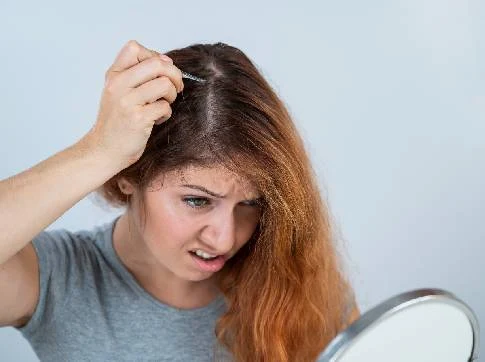All About Scarring Alopecia and Hair Regrowth
23 May 2024 Posted By Skinlogics
Scarring alopecia, also known as cicatricial alopecia, is an inflammatory scalp/hair disorder that results in localized, permanent hair loss and scarring. This patchy hair loss is caused by the irreversible damage of hair follicles in the affected areas. Its occurrence can be emotionally challenging for an individual, especially when it causes noticeable and unpleasant holes in the scalp surface.
In scarring alopecia, the hair in the affected areas is permanently damaged because epithelial stem cells present at the outer root sheath of the hair are destroyed. Scar tissue, which lacks hair bulbs, replaces the healthy scalp tissues in these areas, preventing lost hair from regrowing naturally. Therefore, it is uncommon to see hair regrowth in scarring alopecia.
Dermatologists in Noida at Skinlogics can help diagnose and treat scarring alopecia and let patients naturally regrow their hair. But how is hair regrowth possible? Continue reading this article to learn about scarring alopecia and its treatment to restore hair.
You can also watch this video in which our hair loss expert and dermatologist at Skinlogics, the best hair loss clinic in Noida, talks about this condition in detail-
What Causes Scarring Alopecia?
Unlike androgenetic alopecia, which is caused by the hair follicles' sensitivity to male hormones, scarring alopecia is not caused by a gradual change in the hair growth cycle. Instead, it is caused by the loss of hair bulbs.
Chronic inflammation, wound healing, the loss of hair cells and sebaceous glands on the scalp, and the further appearance of scar tissue are the leading causes of scarring alopecia.
All of this can happen due to metabolic degradation, infections, autoimmune diseases, genetic susceptibility, or recurrent damage, such as advanced trichotillomania, burns, radiation, or even chemical attacks on the scalp. Cancer treatments that induce burns on the scalp, such as radiotherapy, can also harm hair follicles, resulting in irreversible hair loss.
A medical condition called lichen planopilaris (LPP), commonly known as lichen planus, can also be the culprit. LPP is a skin condition that affects hair-bearing areas. It destroys hair follicles, leaving scar tissue in their place, causing both hair loss and scar tissue formation.
Centrifugal central scarring alopecia, also known as traction alopecia, is a scarring alopecia that commonly affects African-American women. It can occur because of popular hair care procedures such as frequent braiding, weaving, and using straightening products.
If you are experiencing this issue, home remedies won’t help. It is important to consult a dermatologist in Noida or near me to rule out the causative agent and manage the issue effectively.
What Are The Main Signs Of Scarring Alopecia?
The noticeable signs of scarring alopecia are smooth, shiny, scarred skin with no hair growth. In some patients, hair loss may develop gradually with few symptoms; for others, it may occur rapidly over months. In the latter case, people experience burning and itching in the affected areas. The affected areas may appear red and develop pustules or scaling.
How Do Dermatologists Diagnose Scarring Alopecia?
Diagnosis of scarring alopecia involves a thorough clinical exam of the scalp condition and a biopsy. In a biopsy, a dermatologist or hair loss treatment doctor takes a small sample of the scar tissue of the affected areas of the scalp and studies it under a microscope. A biopsy is done to get information about the inflammation's location, type, and severity. It can confirm the diagnosis and rule out the possibility of another type of autoimmune-related localised alopecia.
Scarring alopecia can cause variable levels of hair loss and scarring. A proper diagnosis helps patients understand the potential consequences of a hair transplant, allowing them to set reasonable expectations for the degree of improvement and the number of sessions required for optimal results.
Furthermore, diagnosing scarring alopecia facilitates the provision of comprehensive professional care and proper aftercare. Patients diagnosed with scarring alopecia may require ongoing medical therapy or additional procedures with their hair transplant to regrow their hair naturally. An accurate diagnosis ensures that a well-rounded treatment plan is developed, increasing the overall success of the patient's hair restoration journey.
How Do Dermatologists Help Scarring Alopecia Patients Regrow Hair?
To treat scarring alopecia effectively, the underlying cause must be properly diagnosed. The treatment depends upon the cell types that have been causing inflammation.
Options for treatment for scarring alopecia in Noida at Skinlogics may include oral or biological, topical, or injected anti-inflammatory medications. Hair transplantation is an ideal solution to restore natural hair growth.
Hair Transplantation for Scarring Alopecia
Hair transplantation is the most efficient way to restore hair bulbs in damaged areas. It is a cosmetic, minor surgery wherein the surgeon removes healthy hair follicles and re-implants them in scarred areas of the scalp. This procedure is ideal for scarring alopecia because it allows many grafts to be implanted in a limited area while maximising graft survival, resulting in a natural appearance.
Hair transplantation for scarring alopecia poses unique complications, primarily due to degenerative changes and decreased blood flow to scarred tissues. Complications can also occur when scarring extends into the patient's safe donor area, resulting in insufficient grafts needed for complete covering. Before performing a hair transplant treatment on patients with primary scarring alopecia, such as lichen planopilaris, it is critical to determine that the condition is inactive.
The patient's unique situation ultimately determines the most effective hair transplant method for scarring alopecia. The level of scarring, ongoing inflammation, and the patient's overall health are crucial factors in deciding the best strategy.
The FUE (Follicular Unit Extraction) method remains the gold standard in hair transplantation for scarring alopecia. Using a specialized micro punch device enables a thorough and focused approach. This precision in hair harvesting is instrumental in scarring alopecia cases, where preserving existing hair and preventing further scalp damage is essential. FUE is especially appealing for people with scarring alopecia because it leaves minimal scarring, making it an excellent choice for those looking for a less noticeable donor site scar. This procedure has great precision and is noted for its natural-looking results.
Who Can Opt For Scarring Alopecia Treatment With a Hair Transplant?
The extent of scarring is an essential criterion in determining hair transplant candidates among scarring alopecia patients. Patients with limited or localized scarring may be better candidates for hair transplant. That’s because severe scarring can compromise graft survival and overall success. A complete evaluation by a skilled hair transplant specialist is required to determine the patient's suitability for scarring alopecia regrowth with a hair transplant.
Active inflammation in the scalp is a further serious problem. Hair transplant treatments are often more successful for people with stable or inactive scarring alopecia. Active inflammation can jeopardise the effectiveness of a hair transplant. Thus, patients should seek medical attention to reduce inflammation before considering the treatment.
FAQs About scarring alopecia in Noida
1. Is scarring alopecia caused by stress?
Stress is a significant factor in various health problems, including hair loss. Scarring alopecia is characterised by inflammation and the destruction of hair follicles, differentiating it from more frequent stress-related hair loss, such as telogen effluvium. Stress does not directly cause scarring alopecia, but it can exacerbate or provoke some types of scarring alopecia.
2. Is hair transplantation a solution for scarring alopecia?
While there are treatments available to manage the symptoms and reduce the advancement of scarring alopecia, individuals who are affected may find it difficult to naturally restore a full head of hair. However, there is hope with hair transplants. A hair transplant for scarring alopecia not only promises hair regrowth in scarring alopecia patients but also the restoration of self-esteem for those suffering from this condition.
If you or a loved one has this condition, then it is high time to get it addressed with a dermatologist. They can help you manage or reverse this issue with their treatments and proper diagnosis. For more details, you can also get in touch with a hair fall doctor in Noida at Skinlogics. You can also share the video to spread awareness!


